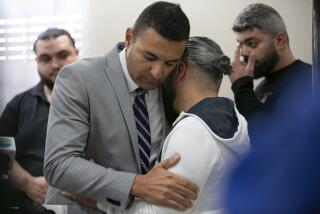The Challenge of Islamic Resurgence : Muslims: The rise of religion-influenced political parties overseas demands a new approach in U.S. policy.
- Share via
With the Islamic party making significant electoral gains in the pivotal country of Turkey last month, Islamic resurgence is more clearly becoming a challenge to U.S. policymaking. The kind of relationship that evolves will determine whether the future of Islam and the West can be mutually beneficial or mutually agonizing.
Unfortunately, there has been scant attention paid to understanding and engagement with leaders of Islamic movements. The U.S. response to Islamic resurgence is usually politicized, typically by congressional hearings that fuel fears rather than resolving them. One House subcommittee, for example, held a forum entitled, “The Rise of Islamic Extremism in Africa.” To many in the West, this rise calls for confrontation, while to those in the Muslim world, “extremism” mischaracterizes a renewal movement long overdue for serious attention.
Radical elements in both the Western establishment and the Muslim leadership have exploited the gulf of misunderstanding, but they should not dictate the debate. The U.S. must engage in an objective dialogue with Islamic movements to determine policy with each group and stop turning a blind eye to the corruption, oppression and radicalization of favored regimes in the Muslim world that are unrepresentative of their people. If the current course persists, we Americans will find ourselves forced to pay more in money and human lives to correct mistakes that are preventable today.
A new path of understanding is in order. Otherwise, our history will repeat the errors of Europe’s fatal misassessments in the colonial Muslim world. As National Security Advisor Anthony Lake has said: “American policy must seek to develop and maintain as wide an international consensus as possible that our common foe is oppression and extremism, whether in religious or secular guise.”
A new approach must begin with an understanding that the Islamic resurgence is not monolithic, but the effort of locally based groups that cover a wide range of sociopolitical views and goals.
There are some general principles that should guide a better-informed U.S. policy: Promote democracy in the Islamic world, including recognition of minority rights; review American interests through domestic discourse to see how they can be secured without forfeiting the moral standard of human rights as a pillar of American values; and denounce extremism and the rhetoric of violence without singling out one group or religion.
With the assassination of Prime Minister Yitzhak Rabin by an Israeli, it is evident now more than ever before that terrorism cuts across all religions, all races and all ethnicities. According to the State and Justice departments, extremist groups claiming an Islamic ideology represent only a fraction of terrorist incidents worldwide; those of Jewish and Christian backgrounds are responsible for the greatest number of casualties. To view extremists of Muslim background, such as those involved in the World Trade Center bombing, therefore, as the primary perpetrators of terrorism is not only unfair but also hypocritical.
Another parameter of policymaking should also be examined more closely: time. As time changes, so do relationships. Those who were once regarded in some quarters as terrorists are now recognized as international leaders by the U.S. government--Yitzhak Shamir of Israel, Gerry Adams of the IRA, Yasser Arafat of the PLO and Nelson Mandela of South Africa. Additionally, there would have been no Dayton peace agreement for Bosnia without the participation of a war criminal, Slobodan Milosevic of Serbia, who has been implicated by U.S. officials in the mass rapes and concentration camps in Muslim Bosnia.
Obviously, there is a precedent for dialogue with Islamic resurgence leaders, even if labeled “extremist” by U.S. policymakers and pundits.
Dialogue is not about blessing sinful behavior, but rather about exploring and capitalizing on potential benefits while minimizing potential losses. What has been the hallmark of U.S. policymaking should not end simply because dealing openly with leaders of Islamic movements would upset the feelings of a few special interest groups.
Washington needs to consider the usefulness of American Muslims in this important endeavor. The road to cooperation could be paved through Los Angeles, New York, Chicago, Dallas and other American cities before peace and other U.S. interests are secured in Jerusalem, Riyadh, Baghdad, Cairo, Karachi and other Muslim cities. Graham Fuller, author of “The Geopolitics of Islam and the West,” writes: “Muslim communities in the West are more likely to exert influence on their countries and cultures of origin than to receive influences from them; over time they may have a substantive effect on the perception of secularization and minority rights in the Middle East itself.” As the new year begins, American Muslims are calling on our political leaders, not asking what our country can do for us, but what we can do for our country.
More to Read
Sign up for Essential California
The most important California stories and recommendations in your inbox every morning.
You may occasionally receive promotional content from the Los Angeles Times.













